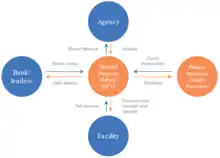Concession (contract)
A concession or concession agreement is a grant of rights, land or property by a government, local authority, corporation, individual or other legal entity.[1]

Public services such as water supply may be operated as a concession. In the case of a public service concession, a private company enters into an agreement with the government to have the exclusive right to operate, maintain and carry out investment in a public utility (such as a water privatisation) for a given number of years. Other forms of contracts between public and private entities, namely lease contract and management contract (in the water sector often called by the French term affermage), are closely related but differ from a concession in the rights of the operator and its remuneration. A lease gives a company the right to operate and maintain a public utility, but investment remains the responsibility of the public. Under a management contract the operator will collect the revenue only on behalf of the government and will in turn be paid an agreed fee.
A grant of land or property by a government may be in return for services or for a particular use, a right to undertake and profit by a specified activity, a lease for a particular purpose. A concession may include the right to use some existing infrastructure required to carry out a business (such as a water supply system in a city); in some cases, such as mining, it may involve merely the transfer of exclusive or non-exclusive easements.
In the private sector, the owner of a concession — the concessionaire — typically pays either a fixed sum or a percentage of revenue to the owner of the entity from which it operates.[2] Examples of concessions within another business are concession stands within sporting venues and movie theaters and concessions in department stores operated by other retailers. Short term concessions may be granted as promotional space for periods as short as one day.
Depending on what the law that is related to a sector states, concession can either allow the authority to retain or keep ownership of the assets, turning over to the concessionaire and reverting the ownership back to an authority once the duration of their concession ended, or both the authority and concessionaire own the facilities.
Early history
Muhammad Ali of Egypt used contracts called concessions to build cheap infrastructure - dams and railroads - whereby foreign European companies would raise capital, build projects, and collect most of the operating revenue but would provide Ali's government with a portion of that revenue.[3] For other examples of concessions, see Gibbons v. Ogden and United States railroad policy.
European Union regulation
Within the European Union, the granting of concessions by public bodies is subject to regulation. Works concessions have been subject to award rules for some time as Directive 2004/18/EC of the European Parliament and of the Council of the EU on public procurement applied to works concessions. The award of services concessions with a cross-border interest has been subject to the principles of the Treaty on the Functioning of the European Union. The European Commission had originally included public concession contracts in the Services Directive of 1992, but these were removed from its scope by the European Council.[4] However, the European Parliament and the Council issued a further Directive 2014/23/EU on the award of concession contracts on 26 February 2014,[5] which required EU member states to introduce national legislation covering the award of concession contracts in excess of EUR 5,186,000 awarded on or after 18 April 2016.
In the UK, the equivalent threshold for concession contracts is £4,104,394.
References
- What is a concession agreement?, wisegeek.com
- Definition of concession agreement investorpedia.com
- Karabell, Zachary (2003). Parting the desert: the creation of the Suez Canal. Alfred A. Knopf. p. 34,36. ISBN 0-375-40883-5.
- England and Wales Court of Appeal (Civil Division), JBW Group Ltd v Ministry of Justice (2012) EWCA Civ 8 (16 January 2012), accessed 3 January 2021
- Directive 2014/23/EU of the European Parliament of the Council on the award of concession contracts